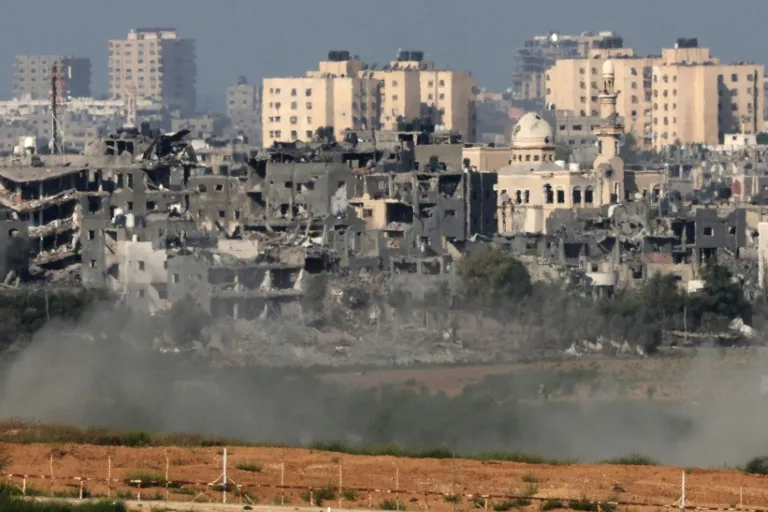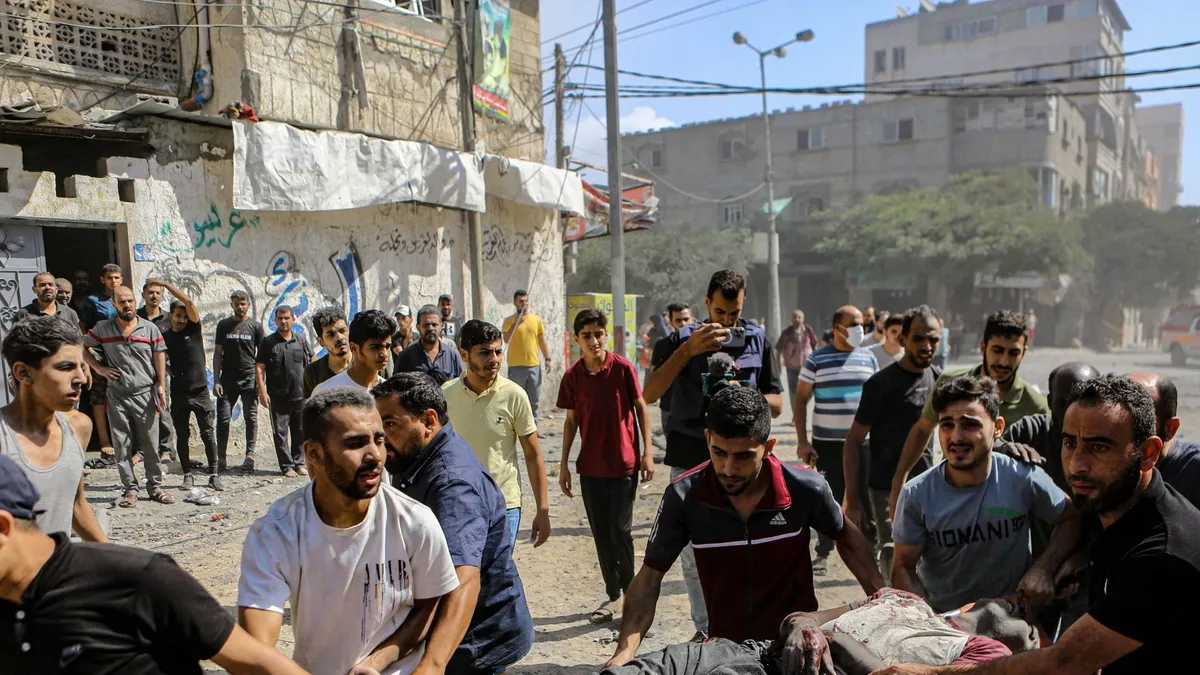Gaza Humanitarian Crisis Deepens As One Million Displaced Amid Israeli Strikes
Gaza humanitarian crisis deepens as one million displaced amid Israeli strikes. Diplomatic efforts are continuing to secure a ceasefire for aid delivery and foreign citizen evacuation while Israeli forces continued their relentless bombardment of Gaza, with no end in sight to the ongoing conflict.
Author:Suleman ShahReviewer:Han JuOct 17, 202359K Shares809.5K Views

Gaza humanitarian crisis deepens as one million displaced amid Israeli strikes. Diplomatic efforts are continuing to secure a ceasefire for aid delivery and foreign citizen evacuation while Israeli forces continued their relentless bombardment of Gaza, with no end in sight to the ongoing conflict.
Heaviest Airstrikes
Residents in Hamas-ruled Gaza reported that overnight airstrikes were the most severe yet, marking the 10th day of the conflict.
The possibility of an imminent Israeli ground offensive in the densely populated coastal strip intensified, raising concerns about further casualties and destruction.
Diplomatic endeavors have been in motion to facilitate the delivery of aid to the besieged enclave and the safe evacuation of foreign citizens.
However, Israeli military spokesperson Rear Admiral Daniel Hagari emphasized that there was no ceasefire plan, as they continued their fight against Hamas, which they deemed a "murderous organization."
The ongoing conflict began on October 7 after Hamas militants attacked Israel, resulting in the deadliest single day in Israel's 75-year history, with 1,300 people killed.
The toll has since been rising, with Gaza bearing the brunt of Israeli airstrikes. Authorities in Gaza have reported over 2,750 deaths, including a quarter of children, and nearly 10,000 wounded. Tragically, around 1,000 people remain missing and are believed to be trapped under rubble.
Humanitarian Crisis In Gaza
As the violence continues, Gaza faces a dire humanitarian crisis. Food, fuel, and water supplies are running short, and aid from several countries has been held up in Egypt, awaiting a safe delivery agreement.
The situation is compounded by the lack of electricity, with Gaza having no power for five consecutive days, pushing vital services to the brink of collapse.
The potential for a broader conflict escalation is a cause for concern, both regionally and internationally.
The United States has sent two aircraft carriers to the Eastern Mediterranean as a deterrent, as cross-border clashes between Israel and Iranian-backed Hezbollah in Lebanon intensify.
The U.S. Secretary of State has engaged in diplomatic efforts to contain the situation and prevent further escalation.
Gaza's north, reportedly housing Hamas militants in a tunnel network, has been the target of Israeli airstrikes.
Bombing in these areas has severely affected the Al-Quds hospital and the Civil Emergency and Ambulance Service offices in Gaza City.
As a result, thousands of Palestinians have fled their homes, with over one million people displaced within Gaza.
The United Nations has expressed its inability to provide humanitarian assistance, and the situation is further exacerbated by power outages and water shortages.
International Response
The international community, including the United Nations and several foreign governments, has criticized Israel's evacuation calls, arguing that Gazans effectively have nowhere to go due to closed Israeli-controlled crossings and Egypt's closure of the Rafah border.
The U.S. government is particularly concerned about the safety of 155 hostages taken to the Gaza Strip and is working to secure their release.
Pope Francis has called for the creation of humanitarian corridors in Gaza and emphasized the need to protect the lives of civilians, particularly children, the sick, the elderly, and women.
However, the ongoing violence and dire humanitarian conditions remain the primary focus of the conflict, with no immediate resolution in sight.
The situation in Gaza continues to be a critical international concern, with the world watching as diplomatic efforts, humanitarian assistance, and the quest for peace remain elusive in the face of escalating violence and human suffering.
Final Words
The situation in Gaza remains dire, with Israeli forces continuing their bombardment and no ceasefire in sight.
The ongoing conflict has led to a significant loss of life, a humanitarian crisis, and a heightened risk of regional escalation.
International efforts to secure aid delivery and foreign citizen evacuation have faced numerous challenges.
The world continues to watch with deep concern as the people of Gaza endure immense suffering, underscoring the urgent need for a peaceful resolution to this ongoing crisis.

Suleman Shah
Author
Suleman Shah is a researcher and freelance writer. As a researcher, he has worked with MNS University of Agriculture, Multan (Pakistan) and Texas A & M University (USA). He regularly writes science articles and blogs for science news website immersse.com and open access publishers OA Publishing London and Scientific Times. He loves to keep himself updated on scientific developments and convert these developments into everyday language to update the readers about the developments in the scientific era. His primary research focus is Plant sciences, and he contributed to this field by publishing his research in scientific journals and presenting his work at many Conferences.
Shah graduated from the University of Agriculture Faisalabad (Pakistan) and started his professional carrier with Jaffer Agro Services and later with the Agriculture Department of the Government of Pakistan. His research interest compelled and attracted him to proceed with his carrier in Plant sciences research. So, he started his Ph.D. in Soil Science at MNS University of Agriculture Multan (Pakistan). Later, he started working as a visiting scholar with Texas A&M University (USA).
Shah’s experience with big Open Excess publishers like Springers, Frontiers, MDPI, etc., testified to his belief in Open Access as a barrier-removing mechanism between researchers and the readers of their research. Shah believes that Open Access is revolutionizing the publication process and benefitting research in all fields.

Han Ju
Reviewer
Hello! I'm Han Ju, the heart behind World Wide Journals. My life is a unique tapestry woven from the threads of news, spirituality, and science, enriched by melodies from my guitar. Raised amidst tales of the ancient and the arcane, I developed a keen eye for the stories that truly matter. Through my work, I seek to bridge the seen with the unseen, marrying the rigor of science with the depth of spirituality.
Each article at World Wide Journals is a piece of this ongoing quest, blending analysis with personal reflection. Whether exploring quantum frontiers or strumming chords under the stars, my aim is to inspire and provoke thought, inviting you into a world where every discovery is a note in the grand symphony of existence.
Welcome aboard this journey of insight and exploration, where curiosity leads and music guides.
Latest Articles
Popular Articles
